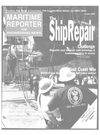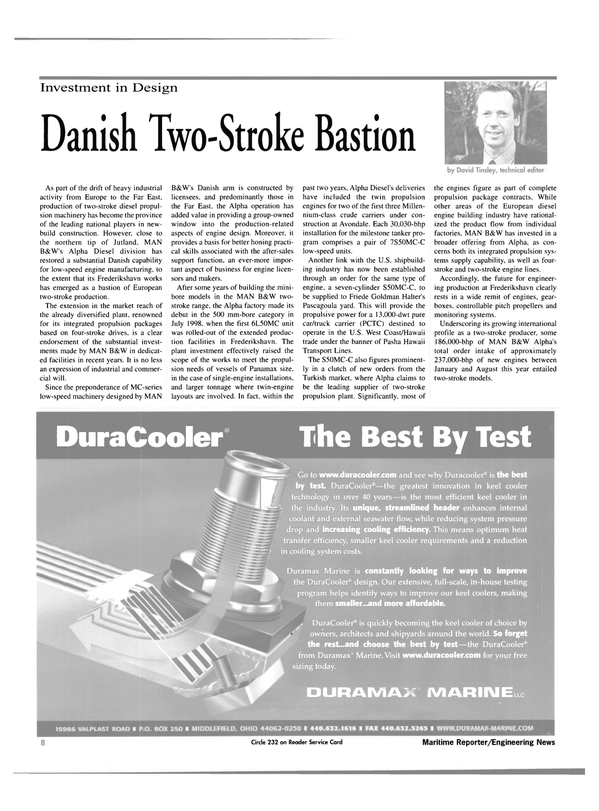
Danish Two-Stroke Bastion
As part of the drift of heavy industrial activity from Europe to the Far East, production of two-stroke diesel propulsion machinery has become the province of the leading national players in newbuild construction. However, close to the northern tip of Jutland, MAN B&W's Alpha Diesel division has restored a substantial Danish capability for low-speed engine manufacturing, to the extent that its Frederikshavn works has emerged as a bastion of European two-stroke production.
The extension in the market reach of the already diversified plant, renowned for its integrated propulsion packages based on four-stroke drives, is a clear endorsement of the substantial investments made by MAN B&W in dedicated facilities in recent years. It is no less an expression of industrial and commercial will.
Since the preponderance of MC-series low-speed machinery designed by MAN B&W's Danish arm is constructed by licensees, and predominantly those in the Far East, the Alpha operation has added value in providing a group-owned window into the production-related aspects of engine design. Moreover, it provides a basis for better honing practical skills associated with the after-sales support function, an ever-more important aspect of business for engine licensors and makers.
After some years of building the minibore models in the MAN B&W twostroke range, the Alpha factory made its debut in the 500 mm-bore category in July 1998. when the first 6L50MC unit was rolled-out of the extended production facilities in Frederikshavn. The plant investment effectively raised the scope of the works to meet the propulsion needs of vessels of Panamax size, in the case of single-engine installations, and larger tonnage where twin-engine layouts are involved. In fact, within the past two years. Alpha Diesel's deliveries have included the twin propulsion engines for two of the first three Millennium- class crude carriers under construction at Avondale. Each 30.030-bhp installation for the milestone tanker program comprises a pair of 7S50MC-C low-speed units.
Another link with the U.S. shipbuilding industry has now been established through an order for the same type of engine, a seven-cylinder S50MC-C, to be supplied to Friede Goldman Halter's Pascagoula yard. This will provide the propulsive power for a 13,000-dwt pure car/truck carrier (PCTC) destined to operate in the U.S. West Coast/Hawaii trade under the banner of Pasha Hawaii Transport Lines.
The S50MC-C also figures prominently in a clutch of new orders from the Turkish market, where Alpha claims to be the leading supplier of two-stroke propulsion plant. Significantly, most of the engines figure as part of complete propulsion package contracts. While other areas of the European diesel engine building industry have rationalized the product flow from individual factories, MAN B&W has invested in a broader offering from Alpha, as concerns both its integrated propulsion systems supply capability, as well as fourstroke and two-stroke engine lines.
Accordingly, the future for engineering production at Frederikshavn clearly rests in a wide remit of engines, gearboxes, controllable pitch propellers and monitoring systems.
Underscoring its growing international profile as a two-stroke producer, some 186,000-bhp of MAN B&W Alpha's total order intake of approximately 237.000-bhp of new engines between January and August this year entailed two-stroke models.
Read Danish Two-Stroke Bastion in Pdf, Flash or Html5 edition of October 2000 Maritime Reporter
Other stories from October 2000 issue
Content
- Danish Two-Stroke Bastion page: 8
- Powering-Up the Finnish Range page: 10
- Marine Employment Resource Debuts page: 13
- From E-Biz to E-Bust: Is Online Chartering and Sale and Purchase Possible? page: 15
- MaritimeDirect Strengthens Its E-Commerce Team page: 16
- Maritime Records and Contracts: Electronically Signed, Sealed, Delivered and Maintained? page: 17
- Maritime Industry Mourns Congressman Bateman page: 24
- BP Takes Three DH Tankers From NASSCO page: 26
- New Technology on Display at Fish Expo I WorkBoat Atlantic page: 27
- South America Gets "Kit" Traelers page: 27
- SSPC Reaches Half-Century Mark page: 29
- New Hempel Coatings Meets Future Requirements page: 31
- Ohio Innovator page: 34
- Corrosion Control Electronically page: 34
- Improving Fuel Efficiency and Maintenance Time Within The Chevron Fleet page: 36
- Litton Avondale Holds Keel Laying Ceremony page: 37
- The Abandoned Shipwreck Act: Useful Tool for Historic Preservation or Paper Tiger? page: 38
- FGH Receives $52 Million Worth Of Orders page: 42
- A Helping Hand In Stralsund page: 43
- SWM Uses Automation To Speed Workflow page: 44
- ShipRepair & Conversion Is A Maritime Exclusive page: 47
- Cammell Laird, Cascade General Enter Agreement page: 48
- Millennium's Vibration Problem Not Related To Gas Turbines page: 50
- On The Waterfront With NNS' Director Of Ship Repair page: 52
- AMHS Ferry Visits Bellingham Bay Shipyard page: 53
- Toftejorg Features Cleaning Concept For Mud Tanks page: 54
- Fleetguard's Centriguard Reduces Emissions page: 54
- Near Miss Caused By Deficient Air Pipes page: 57
- After 25 Years, Smit International Keeps Evolving page: 58
- Atlantic Marine Keeps Docks Working page: 60
- H&W Gets Its $31M From Global Marine page: 60
- National Safety Council To Hold Workshops page: 61
- Good Luck Chartering The "Rust Bucket of the Month" page: 62
- Eyes Onboard page: 62
- Subsea Installation, Heavy Lift And Transport Vessels Show Muscle In FPSO Market page: 64
- Great Lakes' Biggest Dual-Mode ITB Begins Service page: 65
- Hike Metal Constructs Boat For Pilotage Authority page: 65
- Kvichak Delivers To Pilots Association page: 66
- Gladding-Hearn Delivers First Of Two To Charleston Pilots page: 70
- Bollinger To Construct Supply Boat For Lytal Ocean page: 71
- Latest Developments in Engine Room Simulators page: 74
- U.S. Navy Keeps Ship-Shape With Software page: 76
- OSL, Philadelphia Gear Form Alliance page: 79


